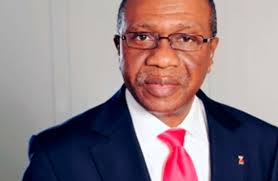A new trading system introduced by the Central Bank of Nigeria stabilized the nation’s currency and will result in daily intervention by the regulator, according to foreign-exchange dealers.
Currency traders can only buy dollars on the interbank market with quotes that are backed by orders from customers, Jibril Aku, vice chairman of FMDQ OTC Plc, told reporters in Lagos on Wednesday. Moving to an order-based two-way quote system will avoid speculation and dissuade people from buying the greenback in anticipation of naira weakness, he said.
“There hasn’t been excess supply or excess demand in the market, indicating stability has returned” since the measures were introduced on Feb. 13, said David Adepoju, president of the Financial Markets Dealers Association, the parent organization of the FMDQ. The central bank will intervene to buy excess dollars “or sell to meet excess demand at the end of each day’s trading,” he said.
Nigeria’s central bank has focused on stemming the naira’s decline by introducing measures that have dried up foreign-exchange trading as the economy gets battered by a slide in oil prices, which account for 90 percent of export earnings and 70 percent of government revenue. It has also depleted reserves to the lowest in more than three years to defend the currency.
The naira gained 0.9 percent to 197.75 per dollar as of 1 p.m. in Lagos. That pared declines this year to 7 percent, the most among 24 African currencies tracked by Bloomberg after Zambia’s kwacha and Ghana’s cedi. Nigerian stocks have dropped 16 percent, the most among 93 primary equity indexes.
The Abuja-based central bank announced an unscheduled auction of dollars at the end of last week to stem the naira’s rout. It sold $401 million at 198.50 naira per dollar, wider than its target band of 159.60 to 176.40, according to Adepoju. The central bank carried out more auctions this week.
“The central bank is expected in the market daily,” said Aku, whose FMDQ is responsible for developing over-the-counter financial markets.














